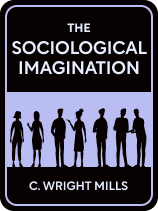

This article is an excerpt from the Shortform book guide to "The Sociological Imagination" by C. Wright Mills. Shortform has the world's best summaries and analyses of books you should be reading.
Like this article? Sign up for a free trial here .
Is abstracted empiricism a constructive approach to social science? What are its flaws?
In The Sociological Imagination, C. Wright Mills contends that not all ways of doing social science are equal. He believes that his way (sociological imagination) is the only one that serves the main purpose of social science—preserving freedom. He offers a critique of other approaches, especially abstracted empiricism, asserting that they fail to protect a free and open society in the way sociological imagination does.
Keep reading for Mills’s evaluation of abstracted empiricism.
Abstracted Empiricism
Mills acknowledges that the negative impact of grand theory is relatively low compared to the main target of his criticism: an approach he calls “abstracted empiricism.” This approach doesn’t attempt to place social science work in the context of people’s lives or major social problems—Mills explains that this is what makes it “abstracted.” Instead, it focuses entirely on “empirical evidence”: data and observations gained primarily through methods like surveys, opinion polls, and interviews.
(Shortform note: For an example of the methodology and theory behind abstracted empiricism, we can look to one of the social scientists Mills criticizes: sociologist Paul Lazarsfeld. Lazarsfeld conducted some of the first-ever market research, and refined the use of focus groups in empirical studies. He also wrote Mathematical Thinking in the Social Sciences, a guide for using statistics in social science, and several famous studies based heavily on empirical data. Lazarsfeld suggested that the work of sociologists was primarily based on developing new methods of research, and that they could act as a bridge between theoretical social philosophy and data-based research.)
Abstract empiricists believe that social science based entirely on empirical evidence has two main benefits: provability and practicality.
Benefit #1: Provability
Using empirical evidence, an abstract empiricist can systematically observe, test, and measure a specific hypothesis. They believe that this high burden of proof ensures that they base their arguments on real, observable reality instead of theories or speculations.
Example: An abstract empiricist surveys Joe and other people like him about happiness in their marriages. Then, if they claim that Americans are or are not happy in their marriages, they have concrete data to back up this claim.
(Shortform note: Most scholars agree that the desire for provability in social science comes from modernism: a 20th-century philosophical movement that argued that reason, science, and technology could “progress” and improve society. From a modernist perspective, a more rational work of social science would be more beneficial to society—while more theoretical and abstract work would distract from or even slow down social progress.)
Benefit #2: Practicality
Abstract empiricists argue that social science based entirely on empirical evidence is practical: It maintains a reasonable scope. They claim that any attempt to make a broad claim about society fails to recognize the enormous number of factors involved in large-scale societal problems. By using only empirical evidence, abstract empiricists focus on specific questions that they actually can answer. Abstract empiricists note that, while individual works of social science can’t determine larger social truths, accruing enough data over time will eventually allow social scientists to combine this data and definitively prove some larger social reality.
Example: An abstract empiricist doesn’t ask, “Why do half of all American marriages end in divorce?” because answering that question requires the impossible task of accounting for every factor involved in American divorces. Instead, they might ask, “Which demographics in a particular region have the highest divorce rates?” Then they would interview Joe and others like him to get data that answers this question. In theory, data on who gets divorced could later help social scientists determine why people get divorced.
(Shortform note: While Mills talks about practicality as the ability to answer a question, many social scientists suggest that for large-scale problems, it’s often hard to know what question to ask. For problems that involve many factors, there isn’t a clear place where a social scientist should start their research. Abstracted empiricism limits its scope to avoid this issue—other social scientists suggest that asking the right question is often a matter of challenging deep-seated existing assumptions or studying specific unexplained events. Example: An economist might examine the 2008 financial crisis—and then notice the major problem that existing statistical models can’t predict similar financial meltdowns.)
Flaws of Abstracted Empiricism
Mills explains that the flaws of abstracted empiricism are the two main assumptions built into the approach: the definitions of “provability” and “practicality.” He argues that these definitions are narrow and flawed to the point where abstracted empiricism can’t create social science that preserves freedom—and sometimes creates social science that harms freedom.
In this section, we’ll explore the following:
- The flaws in the definition of “provability”
- The flaws in the definition of “practicality”
- How abstracted empiricism threatens freedom
The Flaws of “Provability”
Mills explains that abstracted empiricism uses a definition of “provability” that doesn’t properly apply to the social sciences. Abstracted empiricism attempts to use the scientific method to “prove” a claim, measuring and observing to study a hypothesis to determine if it’s correct or incorrect. But the social sciences don’t just deal with correct and incorrect—they also study competing values and beliefs. In such a circumstance, there is no simple “correct” or “incorrect,” therefore, the scientific method doesn’t actually “prove” anything.
Example: An abstract empiricist studies happiness in American marriages. During this survey, they ask Joe, “Are you happy in your marriage?” and Joe answers, “Yes.” However, there are competing values behind Joe’s answer—on a personal level, Joe is deeply unsatisfied with his marriage. But, his society teaches him that he should get married at a young age and commit to this marriage. A survey misses the context of these conflicting values—personal satisfaction and societal obligation—and therefore fails to grasp whether or not Joe is actually happy in his marriage.
| Provability and the History of Economics Some scholars suggest that bias towards quantifiable, “provable” social science explains why economics is the social science with the most social and political clout. They explain that economists began to rely heavily on mathematics as a way to mimic the natural sciences—an approach that made people view their discipline as the most “provable” (and therefore most useful) social science. However, the pursuit of provability led to flaws in their work. For example, economists assumed for decades that people generally made rational economic decisions. This way, they believed their rational methods could also predict human behavior—people will generally act in their rational economic self-interest. However, psychological research eventually proved that people often make irrational economic decisions—exposing a major flaw in economics that resulted from the pursuit of provability. |
What Versus Why
Mills explains that reliance on the scientific method means that abstracted empiricism can find out what is true but not why it’s true. “Why” requires a broader understanding of personal and historical circumstances, and is therefore beyond the scientific method—and beyond abstracted empiricism.
Example: An abstract empiricist needs to understand Joe’s life experiences to grasp why he is personally unsatisfied in his marriage. They also need to understand the history of America to grasp why Joe might feel socially obligated to stay in his marriage. Data and observations alone can’t explain either of these—because of this, the abstract empiricist can’t understand why Joe says he’s happy in his marriage on a survey.
| The Process of Asking “Why” You might be wondering what it means on a practical level to ask “why” in a work of social science. Some scholars define this as the practice of developing theory, and outline three main steps for doing so: 1) Find an interesting occurrence: During observations of empirical evidence and real-world examples, look for some kind of pattern, peculiarity, or occurrence that you can’t easily explain. For instance, a political theorist might examine different existing governments and notice that states with larger legislatures have fewer wars. 2) Consult existing scholarship: Then, search existing academic works for other views and perspectives on the same occurrence. If there are none, consult works on similar topics. For instance, the political theorist reads an article suggesting states with larger legislatures have fewer wars because the people hold greater accountability over their individual representatives. 3) Craft an explanation: Combine multiple perspectives or try to explain potential gaps or flaws in the existing scholarship. For example, the political scientist suggests that states with large legislatures only have fewer wars if they also have high levels of political participation—otherwise, the people don’t hold their representatives accountable. |
The Flaws of “Practicality”
Mills argues that abstracted empiricism uses a definition of practicality that’s biased toward circumstances specific to abstract empiricist research. This bias means that the abstract empiricist’s definition of practicality isn’t an objective standard for judging social science—it’s just a judgment of what’s better for them. Understanding why this is the case requires understanding how social scientists use abstract empiricism.
(Shortform note: While Mills mainly discusses the bias inherent in the modern definition of practicality, other critics of “practical” work cite the history of philosophy in their arguments. Specifically, they reference the fact that “practical” scientific methods originate from theory-heavy works. Philosophers like Aristotle and René Descartes both argued for empirical, rational methods in their work—arguments that influenced great scientists like Isaac Newton. This suggests that theory-heavy work is important for determining what practicality is and why and how it’s useful–something that Mills himself does here.)
Using Abstracted Empiricism
Mills claims that abstract empiricists actually define “practical” social science as the social science that is beneficial to a political, military, or economic institution. Abstracted empiricism requires much more funding compared to other social science due to its reliance on surveys, studies, and interviews. As a result, it’s mostly used by powerful political, military, or corporate institutions. Mills explains that the governments and corporations that hire abstract empiricists demand tangible results for the money they spend on social science—and that a demand for results informs abstracted empiricism’s definition of practicality.
(Shortform note: For an example of how institutions inform the definition of practicality, you can look to the rapidly expanding field of UX (user experience) research. A UX researcher works for a company and conducts surveys, interviews, and polls to determine how users experience that company’s products. Using this job as a reference, it’s easier to understand abstracted empiricism’s definition of practicality: A UX researcher doesn’t try to answer broader questions about their product or company and its place in society—answering those questions doesn’t make the company more profitable. Instead, UX researchers just focus on specific empirical data their employer can use to improve products and increase profits.)
Abstracted Empiricism and Threats to Freedom
These flawed conceptions of provability and practicality contribute to Mills’s main criticism of abstracted empiricism: Not only does it fail to preserve freedom (his stated goal of social science), it actively threatens a free society. Let’s examine each part of this claim in detail.
Fails to Preserve Freedom
Abstracted empiricism fails to meet all three standards of Mill’s definition of freedom:
1) Understand: Abstracted empiricism can’t help individuals understand the connection between their lives and major social problems. Its methods can’t answer why one impacts the other, and can’t take a wide enough scope to study larger social problems.
2) Debate: Abstracted empiricism doesn’t invite further debate on social problems—it can’t suggest why these problems occur, or why a potential solution might fix them.
3) Decide: People who don’t understand major social problems or how to debate them will tend toward political apathy rather than social or political action.
(Shortform note: While Mills argues that abstracted empiricism doesn’t inspire understanding, debate, and political action, others suggest that empirical studies can and do inform the decisions of policymakers. Proponents of empirical studies might suggest that this means their work preserves freedom: It helps policymakers understand social problems, debate potential solutions, and make a decision that they think will benefit society. On the other hand, Mills argues that this is merely social scientists working on behalf of governments, rather than on behalf of their people. The difference comes from how these social scientists see governments: Pro-empiricists see them as potential allies, while Mills sees them as potential threats.)
Actively Threatens Freedom
Mills argues that abstracted empiricism doesn’t just fail to preserve freedom—it actively threatens freedom by creating non-ideological and amoral social scientists that work on behalf of powerful political, military, and economic institutions. Abstracted empiricism doesn’t train social scientists to examine the impact that such institutions have on people’s lives. Doing so is beyond the scope of their methods—abstracted empiricism cannot ask why. This means that abstract empiricists won’t recognize if their research benefits an institution that is unethical or actively challenges freedom. They create social science that doesn’t take a moral or ideological stand in favor of a free society—to them, it’s just a job.
(Shortform note: While Mills suggests that amoral abstract empiricists could work directly for major institutions, mounting evidence shows that social scientists often worked for major institutions indirectly without even realizing it. The CIA and Pentagon created and shaped entire fields of research through funding—funding that often came from fronts. While some social scientists did (and do) work directly for the CIA or Pentagon, others unknowingly conducted research that benefitted these institutions. This suggests that major social institutions didn’t even need to “create” amoral social scientists like Mills suggests—they just needed to subtly direct existing researchers.)

———End of Preview———
Like what you just read? Read the rest of the world's best book summary and analysis of C. Wright Mills's "The Sociological Imagination" at Shortform .
Here's what you'll find in our full The Sociological Imagination summary :
- C. Wright Mills's theory of how social science can preserve freedom
- What grand theory is and how it's flawed
- How social science based entirely on empirical evidence harms freedom






